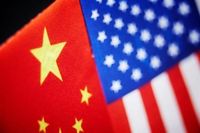China is imposing stringent export controls on antimony, a critical mineral used in semiconductors, flame retardants, solar power equipment, and munitions, significantly impacting the supply to the European Union (EU). As of March 20, 2025, customs data has revealed that China has not shipped any antimony to EU countries since October 2024, signaling a severe disruption in the supply chain.
With China accounting for almost half of the global antimony supply in 2023, these restrictions are stirring considerable concern among European manufacturers and policymakers alike. The lack of shipments has led to critically low stock levels within Europe, further exacerbating the existing supply issues.
According to Cristina Belda, a senior analyst at Argus, "Regulus grade II material is up over 300% compared to a year ago." This price surge is rooted in the escalating tensions between the U.S. and China, which have intensified the competition over critical technology and resources.
China's export restrictions began unfolding in August 2024, when Beijing announced plans to impose limits on antimony and related elements, citing national security concerns as the primary motivation. While initial restrictions were implemented in September, these were soon followed by an outright ban on exports to the United States in December 2024, further tightening the world's access to this essential mineral.
The Netherlands, which was the leading EU importer of antimony from China, brought in 3,011.98 metric tons in 2023. However, shipments dropped to just 1,016.65 tons in 2024, with no shipments since October last year. This massive drop illustrates the ripples caused by China’s export policies and the resultant supply crisis that is affecting industries reliant on antimony.
The ongoing five-month pause in Chinese antimony exports to Europe marks a shift from previous rounds of mineral restrictions when exports tended to resume within months as new licenses were granted to exporters. Chinese customs data shows that total antimony exports in 2024 plummeted by 24.1% to 38,632 tons, indicating a broader effect of the government's stringent controls.
Interestingly, Brazil, Thailand, and Russia have continued to receive Chinese antimony supplies despite the restrictions on EU exports. This highlights China's strategy to cater to nations that may align more closely with its political stance, leaving European industries scrambling to find alternative sources.
The repercussions of these export controls extend beyond just immediate price increases; they threaten to disrupt entire supply chains. Antimony is a crucial component for many high-tech applications, and any instability can impact production timelines and cost structures across various sectors.
As the demand for high-tech consumer goods and renewable energy solutions grows, the dependence on critical minerals, like antimony, heightens concerns about geopolitical tensions affecting supply. Analysts are urging a reevaluation of supply chains to avoid over-reliance on a single source.
Looking ahead, markets and governments are contemplating alternative sources and means to secure these vital minerals. The urgency to address such dependencies has become clear, as companies reevaluate their procurement strategies to mitigate risks associated with abrupt supply disruptions.
In conclusion, China's stringent export controls on antimony have raised alarms across Europe, impacting prices and bringing to light the vulnerabilities in global supply chains. As tensions escalate between China and the U.S., the international community is left to navigate a complex web of supply challenges, making essential the exploration and development of diversified sourcing strategies to secure access to vital minerals.






